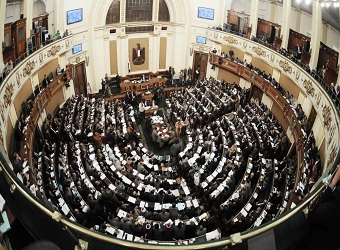Parliamentarian Aly El-Moselhy, head of the parliament’s Economic Affairs Committee, said that they called upon the governor of the Central Bank of Egypt (CBE) to provide a detailed report on Egypt’s foreign debt and the timetable for the repayment of premiums and interest.
He told Daily News Egypt that CBE governor Tarek Amer promised to send the report within days, during a meeting at the parliament last Monday held to explain monetary policy developments in the coming period.
The total external debt of Egypt is currently standing at $60bn in the first three months of the current fiscal year (FY) 2016/2017, compared to $55.7bn at the end of the previous FY.
The International Monetary Fund (IMF) posed expectations for the debt to rise to $66bn at the end of the current FY, then to $102bn by 2021, which represents 26% of the GDP.
El-Moselhy said that Amer had earlier said that the IMF estimates for the exchange rate are EGP 11-11.5 per US dollar after the flotation. In response, according to El-Moselhy, the head of the IMF mission to Egypt Chris Jarvis remarked that the pound had fallen below their expectations.
Yet, El-Moselhy stressed that the flotation decision was righteous, urging the government to promote investment and production to reduce the huge import bill and increase exports.
He added that the monetary policy pursued by the CBE was necessary to restore confidence in the Egyptian economy and create a good investment climate that supports domestic investment and helps attract foreign investment.
He noted that the government should then follow an economic policy that encourages the increase of exports and boosts domestic production, while reducing government spending and adding more people to the social security net to help the most vulnerable groups bear the reform measures.
During the meeting at the parliament, Amer said that tourism revenue fell to $3.4bn in 2016 compared to $11bn in 2010.
Meanwhile, the balance of payments deficit hiked from $4bn in 2010 to register $20bn in mid-June 2016, which pushed the CBE to float the pound and curb the deficit.
Amer noted that export earnings fell from $24bn in 2010 to $19bn in 2016.
Moreover, he said that the value of imports also increased from $49bn in 2010 to $57bn in 2016, which created a gap between exports and imports that reflected on the balance of payments.
In addition, Amer reviewed his plan to expand the state’s foreign exchange reserves, as well as to accelerate the pace of attracting foreign direct investment and begin implementing the government’s IPO programme.
The plan also includes offering international bonds, increasing the banking sector’s supply of hard cash, restoring remittances from Egyptians abroad, boosting exports in two years, and encouraging the return of tourism.
As for the CBE’s plan to curb hard cash consumption, Amer said that the CBE will reduce the balance of payments gap and work to include more components in the production of the local industry, in addition to reviewing imports and developing a plan to tighten conditions for licensing imports.
Source: Daily News Egypt


